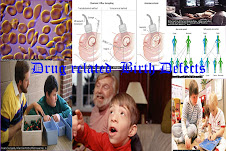· Alcohol can cause a range of birth defects, the most serious being fetal alcohol syndrome
· Children born with alcohol-related birth defects can have lifelong learning and behavior problems
…About 82% of women in their childbearing years (ages 18 to 44) use a medication, including prescription or over-the-counter drugs; vitamins, minerals, or herbal supplements; topical medicines or eye drops. About 46% of these women use a prescription medication.
…All prescription medications are tested to see if they are effective before becoming available to the public. For ethical reasons, pregnant and breastfeeding women are usually not included in these studies. As a result, little information is available about the safety of most medications during pregnancy or breastfeeding when they are first marketed.
…Cocaine crosses the placenta and enters your baby's circulation. The elimination of cocaine is slower in a fetus than in an adult. This means that cocaine remains in the baby's body much longer than it does in your body.
…Babies born to mothers who use cocaine throughout their pregnancy may also have a smaller head and have their growth hindered. Babies who are exposed to cocaine later in pregnancy may be born dependent and suffer from withdrawal symptoms such as tremors, sleeplessness, muscle spasms, and feeding difficulties.
…Some experts believe that learning difficulties may result from use of cocaine as the child gets older.
…Marijuana crosses the placenta to your baby. Marijuana, like cigarette smoke, contains toxins that keep a baby from getting the proper supply of oxygen that he or she needs to grow.
...One of the best-known examples of such a drug- induced birth defect is the Thalidomide disaster
...Women who use illegal drugs, or "street drugs," can have babies who are small, premature, or have other health problems, such as birth defects.
...Abnormalities can occur in any major organ or part of the body. Major defects are structural abnormalities that affect the way a person looks and require medical and/or surgical treatment.
...Recreational drugs. Drugs such as LSD have been associated with arm and leg abnormalities and central nervous system problems in infants. Crack cocaine also has been associated with birth defects. Since drug abusers tend to use many drugs and have poor nutrition and prenatal care, it is hard to determine the effects of individual drugs.
Wednesday, February 4, 2009
Subscribe to:
Post Comments (Atom)


No comments:
Post a Comment